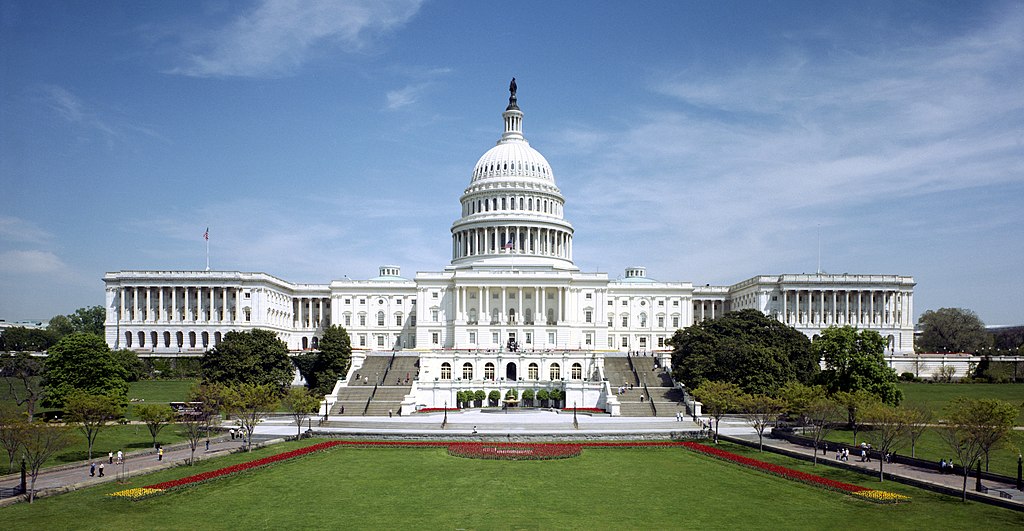Confidence in Government on National Security Matters: February 2018
In July, we began a polling project to measure public confidence in government institutions on national security matters on an ongoing basis. This post provides our data for the month of February. It includes perceptions about government institutions and about the two major political parties’ handling of national security; about the president’s handling of key national security issues; about Special Counsel Robert Mueller’s investigation; and about ongoing military operations.

Published by The Lawfare Institute
in Cooperation With

In July, we began a polling project to measure public confidence in government institutions on national security matters on an ongoing basis. This post provides our data for the month of February. It includes perceptions about government institutions and about the two major political parties’ handling of national security; about the president’s handling of key national security issues; about Special Counsel Robert Mueller’s investigation; and about ongoing military operations.
Confidence in Institutions to Protect U.S. National Security Remains Stable
In the last week of February 2018, we used Google Surveys to ask respondents the following questions about confidence in institutions:
- How much confidence do you have in the Congress to protect U.S. national security?
- How much confidence do you have in the federal courts to protect U.S. national security?
- How much confidence do you have in the president to protect U.S. national security?
- How much confidence do you have in the intelligence community to protect U.S. national security?
- How much confidence do you have in the military to protect U.S. national security?
While public confidence in every institution fell slightly from our results in late January, the results for February come in the context of an overall trend of increasing confidence in the president’s handling of national security when looked at with our polling from previous months.
Across other institutions, the confidence score was consistent with past results, even as they showed a slight month-to-month reduction. On a scale of 1 (“No confidence”) to 5 (“High confidence”), the average score for each institution from highest to lowest score was: 3.83 for the military, 3.06 for the intelligence community, 2.78 for federal courts, 2.73 for the president and 2.43 for Congress. It’s not immediately clear why confidence in all institutions fell between January and February. It could be a sign that the public is simply responding to the continuing discord in Washington.
While the president rated a very slight drop in public confidence in February, the dip in public confidence in his ability to handle national security issues comes in the context of a marked increase since we first began asking respondents this question last July. Specifically, in July average confidence in the president was a 2.58 on our scale. In contrast to the president’s 0.15 increase in average confidence over this time period, average confidence in Congress has remained almost perfectly stagnant at an abysmally low 2.43 on our scale.
Interestingly, this growing support for the president appears to be driven by increasing support from women. Since we began asking this question in July 2017, among women the average confidence in the president on national security has increased from 2.38 to 2.55 in February. Another way to look at this is that the number of women giving Trump a rating of 5, or “high confidence,” has jumped from 15 percent in July to 20 percent in February, while those giving the president a 1, or “low confidence” mark, has dropped from 45 percent to 42 percent. This indicates that women still strongly distrust the president on national security, but he is gaining ground with them much faster than he is with men.
Despite the president’s gains with women, he still suffers from a large gender gap on national security. For example, in February, while women reporting a 5 (high confidence) in Trump rose to 20 percent, 30 percent of men had high confidence in Trump.


The Republican Party’s National Security Advantage Over the Democratic Party Grows
In February, average confidence in the Republican Party’s ability to protect U.S. national security was 2.73, compared with 2.53 for the Democratic Party’s ability. Both parties are perceived more favorably than is Congress as a whole; Congress has an average confidence score of 2.43. Notably, this marks the third straight month that confidence in the Democratic Party has fallen, and the gap between the two parties is larger than at any time since we began asking respondents these questions last August.

Republicans hold an advantage over Democrats on national security when respondents are asked about their confidence in each party separately, and the Republican advantage increases markedly when respondents are asked to choose between the parties or options of “neither” or “don’t know.” When asked in this manner, 31 percent of respondents chose the Republican Party and 22 percent chose the Democratic Party. While the number of respondents selecting the Republican Party dropped nearly four points since January, Republicans still hold a nine-point advantage over Democrats when it comes to confidence in keeping the country safe. Moreover, more respondents chose “neither” (24 percent) or “don’t know” (23 percent) than chose the Democratic Party as doing a better job of protecting the country from international terrorism and military threats. As in January, both “neither” and “don’t know” responses were significantly lower than in previous months, possibly indicating a shift to the Republican Party by previously undecided or ambivalent sections of the population.
Overall, since we began asking this question in October, the Republican Party’s gains have been driven almost entirely by women. While the average confidence score among male respondents has remained fairly consistent at just below a 3 on our scale, women’s confidence in the Republican Party has grown from an average confidence level of 2.41 in October to 2.54 in February. Women generally still don’t support the Republican Party when it comes to national security, but the percentage reporting a 1 (low confidence) has fallen about four points, from 43 to 39 percent. These gains for the Republican Party may be correlated with the increase in confidence in the president’s handling of national security, as the standard-bearer for the party.
Even though Republicans are gaining ground with women on national security, the party still has a large gender gap on the issue. For example, in February 28 percent of men gave the Republican Party a 5 (high confidence), whereas just 17 percent of women gave them this highest level of confidence.

Confidence Remains Low in the President’s Handling of Key National Security Issues
In November, we began asking respondents how confident they were in the president’s ability to handle key national security issues, specifically with regard to Iran, North Korea and terrorism. In February, we once again found that confidence in the president on these topics remains low. Confidence in the president’s handling of each of these issues is well below the level of average confidence in the president’s handling of national security generally (2.73). Moreover, nearly half of respondents (48 percent) report “no confidence” in the president’s ability to handle North Korea. Note that these data predate the recent news that the president has agreed to meet with Kim Jong Un. It will be interesting to see how this impacts public confidence in Trump's ability to handle North Korea when we run the March iteration of this question.

Confidence in Special Counsel Mueller Rises; Growing Evidence of an “Indictment Effect”
Support for Special Counsel Robert Mueller tends to rise and fall with indictments emanating from his team. We first observed this pattern of increased support for Mueller in November, in polling before and after the indictments of Paul Manafort and Rick Gates were made public. In late November and early December, we saw this pattern again in polls we conducted before and after the plea agreement with former national security adviser Michael Flynn was announced. But our February polling provides perhaps the clearest example of how confidence in Mueller spikes when he releases an indictment and then very quickly drops.
As we have since October, we once again asked the public about its level of confidence in Mueller’s “fairness and objectivity” at the end of the month, specifically Feb. 25-28. Average confidence in him then was 2.96 on our scale. However, in a separate survey fielded Feb. 21-23 that asked about public confidence in a number of investigations of Russian influence in the 2016 election, we asked this exact same question, and confidence in Mueller was significantly higher: 3.14. This iteration of the question came just after Mueller’s indictment of 13 Russians for election meddling, and the new indictment of Paul Manafort and Rick Gates occurred while the poll was being fielded. We hypothesize that this timing resulted in what was the highest level of confidence in Mueller that we’ve observed since we began asking this question. What we didn’t expect was that when our second poll ended on Feb. 28—just a week after the first poll began—confidence in Mueller would revert to the lower level. Again, the bump is visible; and, again, the bump is brief.

Confidence in Ongoing Military Operations Falls and Remains Well Below Confidence in the Military
Once again, the military enjoys the highest level of public confidence of any government institution we asked about (3.83 on our scale) yet confidence in ongoing military operations in Afghanistan and Iraq-Syria is markedly lower, with average confidence scores of 2.83 and 2.67, respectively. This large gap in confidence is similar to what we found in November, December and January. What’s notable this month is the large drop in confidence in both conflicts from the levels seen in January. In fact, this is the lowest level of public confidence that we’ve seen since we began asking respondents about these conflicts in November.

Methodology
From Feb. 25-28, we once again used Google Surveys, which is supporting this project with a large in-kind donation of access to its survey platform, to ask a variety of questions related to national security. Respondents are internet users 18 and older who answer “surveywall” questions on websites that use Google Opinion Rewards for Publishers to access content. Surveys appear on a network of more than 1,500 sites, including USA Today and the Financial Times. For more information on Google Surveys’ methodology, including questions regarding sampling bias and inferred demographics, please see Google’s white paper on the topic. Benjamin Wittes and Emma Kohse also discussed criticisms and advantages of the Google Surveys methodology at some length in this paper.







